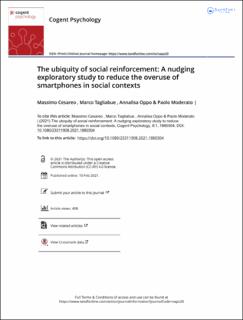The ubiquity of social reinforcement: A nudging exploratory study to reduce the overuse of smartphones in social contexts
Peer reviewed, Journal article
Published version
Permanent lenke
https://hdl.handle.net/11250/2772228Utgivelsesdato
2021Metadata
Vis full innførselSamlinger
Originalversjon
10.1080/23311908.2021.1880304Sammendrag
In this study, we analyze the interaction between smartphones and their users as contingencies of reinforcement underpinning social behavior. We posit the introduction of a nudge: an environmental intervention meant to guide behavior that can be easily avoided in a social context. Our experiment takes us to an Italian pub with the hypothesis that a simple environmental factor (a basket featuring a social cue) will contribute to a reduction in digital social interactions in favor of physical social interactions. Data were collected employing a momentary time sampling where we recorded an increase in estimated time with no smartphone interactions and a decrease in estimated time with all the customers seated at one table using their smartphones in the experimental condition. These results were significant and suggest that the nudge was effective at reducing smartphone use among the patrons. Moreover, the estimates of these digital interactions were shorter for the statistical unit when compared to the control. Together, the results of study demonstrate that a nudge can reduce smartphone use in contexts of social interaction. However, it may be difficult to sustain alternative behavior without providing consequences that reinforce its future occurrences.

